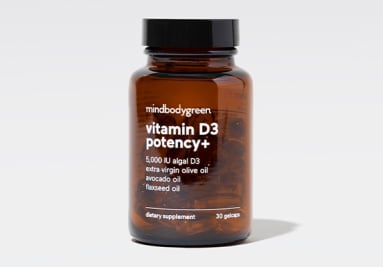I Struggle With Mental Well-Being During Winter — This Helps
I've never thrived during winter, but getting enough vitamin D gives me the extra support I need.

Image by Alexey Kuzma / Stocksy December 1, 2022 As the days get shorter and the weather gets colder, I get nervous because for me, winter often brings mood challenges. Whether it's the sun setting before I'm even done with work, the extra effort it takes to leave the house when the temperature drops, or the gray skies, I've never thrived during winter. I've tried bundling up and going on morning circadian walks to get sun exposure (even if I couldn't feel it). I've spent hours working in the glow of a sunlamp. But this year, I wanted to be proactive and target my seasonal mood issues from the inside out. Enter: mindbodygreen's vitamin D3 potency+. 
Advertisement
This ad is displayed using third party content and we do not control its accessibility features.
The link between vitamin D and mood.
Hear me out: Time and time again, research has linked lower levels of vitamin D to suboptimal mental well-being.
A 2021 systematic review of 15 studies concluded that research supports a link between vitamin D levels and mood1, with lower levels of vitamin D increasing the prevalence of mental health challenges, and higher levels tied to fewer cases and, in some instances, improved mood.
Another 2021 review homed in on the mechanism linking vitamin D and mood, concluding that vitamin D plays an essential role in the synthesis of serotonin2, which is often dubbed the "feel-good hormone" for its role in mood regulation.
All this suggests that vitamin D and mood are inextricably linked. But what does that have to do with winter? Well, since vitamin D is synthesized from sun exposure (and found in low quantities in a small number of foods), I worry about my ability to get optimal amounts during the winter, if not year-round (more on that later).
So, when I heard that mbg's vitamin D3 potency+ delivers a research-backed dose of vitamin D3 with a trio of organic oils for optimal absorption, I figured it was worth a shot.*
My experience with vitamin D3 potency+.
Within a few weeks of taking vitamin D3, I noticed an improvement in my mood; despite gray skies and spending my days inside, I still felt like my sunny summer self.*
Of course, I try to support my mind in other ways too—like making time for movement, prioritizing sleep, eating balanced meals, and leaning on my community. But on days when life gets in the way of my mental self-care routine, I can rest easy knowing that I've done something to support my mood (and whole-body health) just by taking vitamin D3 potency+.*
And I'll continue taking vitamin D3 potency+, even as the seasons change, because I now know that vitamin D insufficiency is far from a seasonal problem.
Advertisement
This ad is displayed using third party content and we do not control its accessibility features.
Why food and sunshine aren't enough.
Despite all the evidence that vitamin D is critical to our health, nearly one-third of American adults are vitamin D deficient (and another 40% are insufficient, meaning the majority of U.S. adults have a vitamin D dilemma). Suboptimal vitamin D status is even more severe among Black and Latino Americans, for whom deficiency rates reach 82%3 and 70%3, respectively.
Many people assume they can meet their vitamin D needs just by spending some time outdoors, but if you live far from the equator (or wear sunscreen) simply getting outside may not do the trick: Altitude, season, clothing, pollution, skin tone, age, and time of day also have to be considered.
As Michael Holick, M.D., Ph.D., professor of medicine, physiology, and biophysics at Boston University Medical Center and author of foundational research on vitamin D synthesis4, previously told mindbodygreen, "Unless you're going to be a lifeguard or a hunter-gatherer, you're not going to make very much vitamin D."
And while eating plenty of foods containing vitamin D is a great start, food alone isn't a practical strategy for most people. A vegetarian like me would have to consume about 10 glasses of fortified milk5 or 20 whole eggs6 just to reach 1,000 IU of vitamin D3 (the body's preferred form). And that amount won't even move the needle if I want to achieve vitamin D sufficiency.
Plus, many experts agree that to reach truly optimal blood serum concentrations of vitamin D (i.e., 50 ng/ml or more), one would have to consume closer to 5,000 IU of vitamin D daily or sometimes more depending on body composition. That nets out to over 100 eggs7 or 50 glasses of milk! (Or, a single gelcap of mindbodygreen's vitamin D3 potency+.)
Other benefits of vitamin D.
While mood concerns were my main motivation for prioritizing vitamin D intake, the benefits of vitamin D go far beyond mood regulation: Vitamin D plays an essential role in bone, muscle, immune8, oral, gut health, and more.*
It may even help with dry skin, as one clinical trial from Nutrients found a correlation between low blood serum levels of vitamin D and lower levels of skin moisture9. So while I love the mood-supporting benefits of vitamin D, I see taking a daily supplement as a strategy for supporting my overall health.*
Advertisement
This ad is displayed using third party content and we do not control its accessibility features.
The takeaway.
Vitamin D plays an essential role in whole-body health—including aspects of mental and emotional well-being.* Despite the key roles vitamin D plays in the body, a huge portion of the U.S. population is vitamin D deficient or insufficient.
With 5,000 IU of high-quality algal organic vitamin D3, mindbodygreen's vitamin D3 potency+ gives me peace of mind that I'm nurturing healthy vitamin D levels in the wintertime, and always.
If you are pregnant, breastfeeding, or taking medications, consult with your doctor before starting a supplement routine. It is always optimal to consult with a health care provider when considering what supplements are right for you.

 Aliver
Aliver 


































